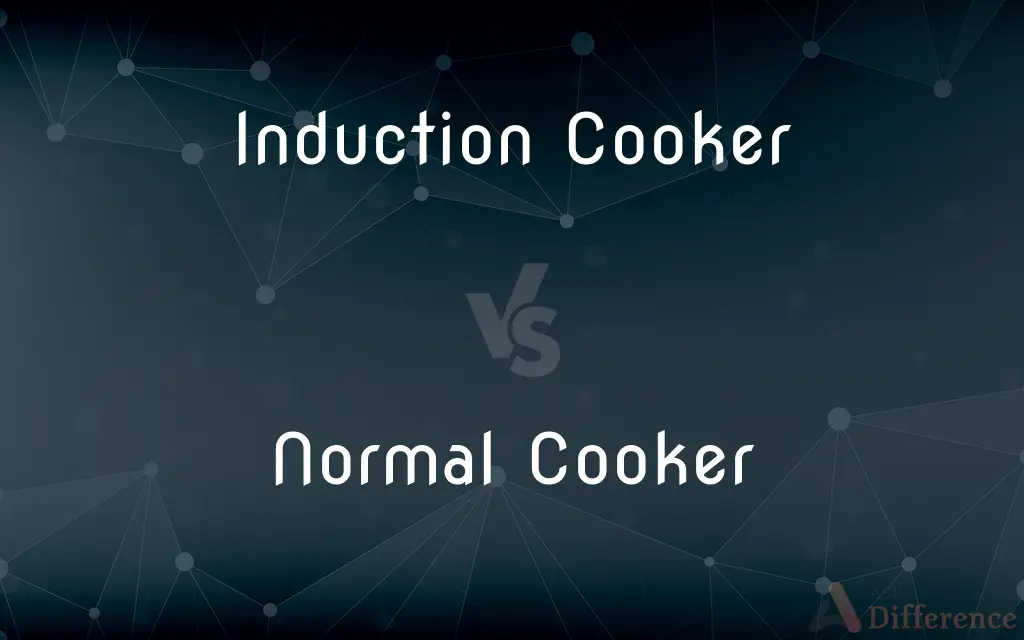Induction Cooker vs. Normal Cooker — What's the Difference?
By Tayyaba Rehman — Published on December 31, 2023
Induction cookers use electromagnetic fields to heat cookware directly, ensuring speed and efficiency. Normal cookers typically use gas or electric heating elements, heating cookware indirectly and often less efficiently.

Difference Between Induction Cooker and Normal Cooker
Table of Contents
ADVERTISEMENT
Key Differences
An induction cooker creates heat using electromagnetic induction, thereby directly heating the cookware and not the surface of the cooktop. On the contrary, a normal cooker, employing either gas or an electric coil, generates heat that then transfers to the cookware, which is an indirect method.
Efficiency is a standout attribute for induction cookers, which heat cookware swiftly and only where contact is made, ensuring minimal energy waste. Normal cookers may exhibit slower heating processes and can lose more heat to the surrounding environment, impacting energy usage.
When considering safety, induction cookers enhance it by not having an open flame or a hot cooking surface, mitigating burn risks. However, normal cookers, especially gas variants, expose open flames and both electric and gas types result in a hot cooktop, presenting more apparent hazards.
Regarding compatibility, induction cookers necessitate cookware with ferromagnetic properties for proper functionality, which may demand specific pots and pans. In contrast, normal cookers generally accommodate a wide variety of cookware, offering more flexibility in this aspect.
In terms of control and adjustability, induction cookers offer rapid response to adjustments in cooking settings, providing precise control over cooking temperatures. Meanwhile, normal cookers, particularly gas ones, also allow good control but may lack the instant adaptability seen with induction technology.
ADVERTISEMENT
Comparison Chart
Heat Generation
Via electromagnetic induction
Through gas flame or electric coil
Energy Efficiency
High, due to direct heating
Lower, due to indirect heating
Safety
Enhanced, no open flame or hot surface
Reduced, potential for burns and fire
Cookware Compatibility
Requires ferromagnetic cookware
Versatile, supports various cookware
Control Precision
Immediate and precise
Good, but with slightly delayed response
Compare with Definitions
Induction Cooker
Presents enhanced safety by eliminating open flames.
I prefer using an induction cooker to keep the cooking surface cool to the touch.
Normal Cooker
Exposes open flames or hot surfaces during use.
Be cautious of the open flame when using a normal cooker to prevent accidental burns.
Induction Cooker
Offers high energy efficiency by directly heating cookware.
Using an induction cooker ensures that minimal energy is wasted during the cooking process.
Normal Cooker
Transfers heat from a source to cookware, providing indirect heating.
My normal cooker heats the pan by transferring heat from the electric coil below it.
Induction Cooker
Provides precise and rapid control over cooking settings.
Adjusting the temperature on an induction cooker results in an immediate change in heat levels.
Normal Cooker
Offers dependable and traditional cooking methods.
I rely on my normal cooker to roast vegetables using conventional cooking techniques.
Induction Cooker
Requires cookware with ferromagnetic properties.
Make sure to use an iron pan on your induction cooker for efficient cooking.
Normal Cooker
Supports a wide variety of cookware materials.
A normal cooker allows me to use any type of pan, from aluminum to ceramic.
Induction Cooker
Utilizes electromagnetic induction to generate heat.
My induction cooker allows me to boil water incredibly quickly due to its rapid heating technology.
Normal Cooker
Employs gas or electric coils for heat generation.
My normal cooker utilizes a gas flame to heat my pots and pans.
Common Curiosities
What is an Induction Cooker?
An Induction Cooker uses electromagnetic fields to directly heat cookware, providing quick and energy-efficient cooking.
Can all types of cookware be used on an Induction Cooker?
No, Induction Cookers require magnetic cookware, often made from iron or magnetic stainless steel.
Is an Induction Cooker faster than a Normal Cooker?
Yes, Induction Cookers often heat food more quickly due to direct heat transfer to the cookware.
How safe is an Induction Cooker compared to a Normal Cooker?
Induction Cookers are often deemed safer as they don't have open flames and cool down quickly after use.
How does a Normal Cooker typically operate?
A Normal Cooker heats using gas flames or electric heating elements, indirectly transferring heat to the cookware.
Can a Normal Cooker be used without electricity?
If it is a gas Normal Cooker, it can often be used without electricity, making it versatile during power outages.
Is a Normal Cooker versatile with cookware choices?
Yes, Normal Cookers can generally accommodate various cookware materials without specific requirements.
Are Induction Cookers energy efficient?
Yes, Induction Cookers are known for their energy efficiency as they directly heat the cookware, minimizing heat loss.
Is special cookware needed for an Induction Cooker?
Yes, an Induction Cooker requires cookware with a ferromagnetic base to facilitate the electromagnetic heating process.
Can Normal Cookers offer precise temperature control?
Normal Cookers generally offer less precise temperature control compared to Induction Cookers, especially in the case of gas cookers.
How do Induction Cookers affect electricity consumption?
While Induction Cookers use electricity, their energy-efficient nature often leads to reduced consumption compared to electric Normal Cookers.
Are Normal Cookers easy to clean and maintain?
Normal Cookers, especially electric ones, may be slightly more challenging to clean compared to the flat, smooth surface of Induction Cookers.
How does an induction cooker generate heat?
Through electromagnetic induction, which directly heats ferromagnetic cookware.
What is a fundamental characteristic of a normal cooker?
It generates heat via a gas flame or electric coil, which indirectly heats cookware.
Are induction cookers suitable for all cooking methods?
Mostly, though they may not be optimal for tasks like charring peppers, which benefit from an open flame.
Which is typically more affordable, Induction Cooker or Normal Cooker?
Generally, Normal Cookers, especially gas cookers, tend to be more affordable than Induction Cookers.
How do Induction Cookers impact indoor air quality?
Induction Cookers do not emit gases or utilize flames, thus maintaining indoor air quality.
Do induction cookers present a burn hazard from the cooking surface?
Less so, as the surface remains comparatively cool, heating mainly under the cookware.
Can normal cookers provide precise control over cooking temperatures?
Yes, especially gas types, but response to adjustments is typically less instant than induction.
Is special cookware always needed for induction cookers?
Yes, cookware must be ferromagnetic, like cast iron or some stainless steel.
Can any pot or pan be used on a normal cooker?
Generally, yes, normal cookers accommodate a wide range of cookware materials.
How safe are normal cookers regarding burn risks?
They pose more risk due to open flames and hot surfaces, demanding cautious usage.
Can normal cookers work during power outages?
Gas cookers can often function during outages, providing a reliable cooking option.
Is cookware compatibility a consideration for induction cookers?
Yes, cookware must have ferromagnetic properties to function on induction cookers.
Which cooker type is traditionally more widespread?
Normal cookers, utilizing gas or electric elements, have been conventional in kitchens for decades.
What might be a drawback of using an induction cooker?
The necessity for compatible cookware and potential for noise during use.
What are common materials used for cookware on Normal Cookers?
Normal Cookers can utilize aluminum, non-magnetic stainless steel, copper, and more, without restrictions.
Are induction cookers energy-efficient?
Yes, they directly heat cookware, minimizing energy loss and enhancing efficiency.
How does cleaning compare between induction and normal cookers?
Induction cookers often have a smooth, easy-to-clean surface, while normal cookers may have more intricate parts to clean.
How do cooking times compare between induction cookers and normal cookers?
Induction cookers tend to heat food quicker due to their direct and efficient heat transfer.
Share Your Discovery

Previous Comparison
Committed vs. In A Relationship
Next Comparison
Peas vs. BeansAuthor Spotlight
Written by
Tayyaba RehmanTayyaba Rehman is a distinguished writer, currently serving as a primary contributor to askdifference.com. As a researcher in semantics and etymology, Tayyaba's passion for the complexity of languages and their distinctions has found a perfect home on the platform. Tayyaba delves into the intricacies of language, distinguishing between commonly confused words and phrases, thereby providing clarity for readers worldwide.













































